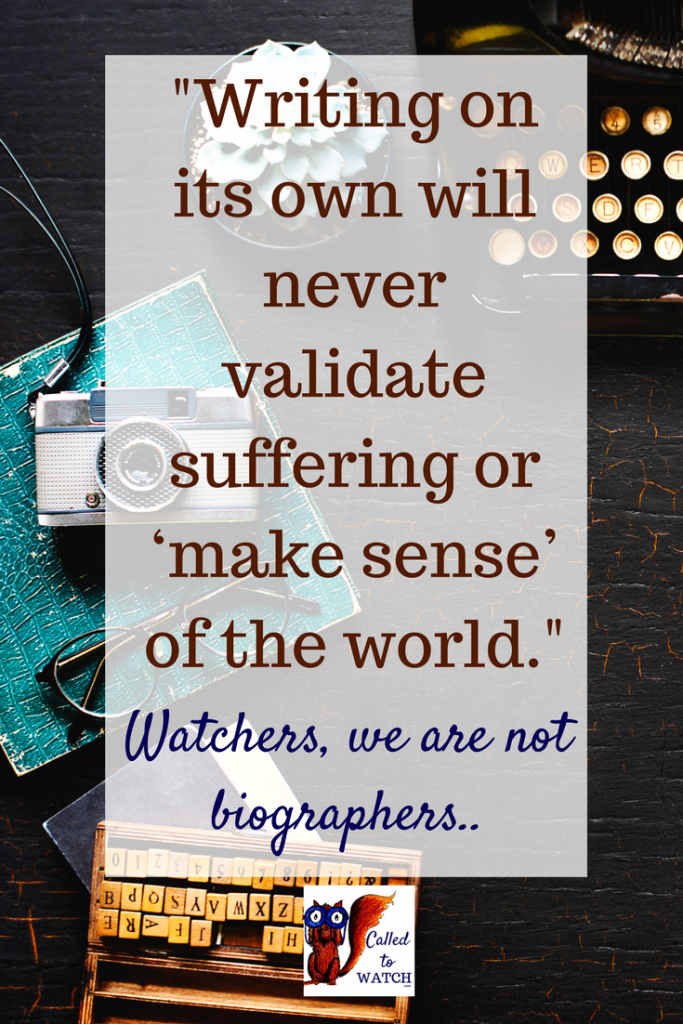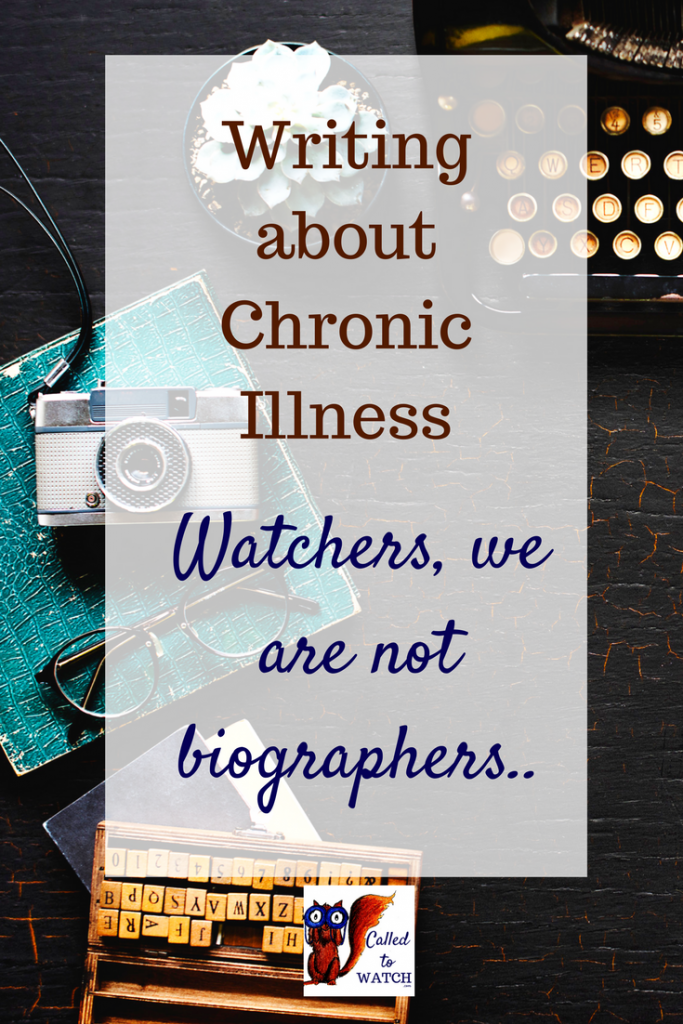Do you feel that if only you had a polished version of your life, it would be a enough to redeem your suffering, because then it would have a purpose?
In short, do you ever neglect your role as a Watcher in order to become ‘Biographer’?
This is what it looks like:
You are often on the look-out for a purpose or a theme behind your Loved One’s suffering, or in day to day occurrences
You have a yearning desire to put each new experience into words so that others can learn
You are tempted to dismiss parts of life which don’t lend themselves to ‘story’
You are drawn to those areas of life which seems just a little bit more dramatic, heroic or exciting
You feel that your life and experiences are wasted if nobody reads about it and learns
I’m going to switch to ‘we’ now, because this is something I am guilty of at times…
Why is it wrong?
-
- Discerning a ‘theme’ in life isn’t enough to ‘redeem it’.
Suffering is not made into a good thing simply because we can explain it
- We may hurt your Loved Ones by glamorising illness – and thus trivialising it
- We may neglect parts of life which are not so exciting
- In reducing ourselves and Our Loved One to ‘characters’ we may neglect to let life impact us deeply – it’s a form of ‘distancing’
Why is it tempting?
- We want to make good come out of bad, something productive out of what seems like chaos – this is natural
- It helps us feel in control
- It’s enjoyable to feel as though we are part of a bigger picture
Some truths:
-
- There is a bigger picture and a resonating theme in our lives – not because of our own machinations but because there is a Master Story-teller
- Sometimes we might be ‘right’ in the themes that we construct, but we never know the full story, because we don’t know the ending
- It is true that life is like a story – but life is not a story, and I think it’s dangerous to treat it as such
It’s not wrong to write or dream of writing, but writing will never on its own validate suffering or ‘make sense’ of the world.
How do we respond?
- We hold onto our writing and perceptions loosely, as gifts not gospel
- We engage in writing and understanding with prayer
- We strive to love our Loved One as a person, not as a character
- We guard against seeing ‘dramatic’ events as good in themselves, or beginning to believe that a ‘lesson learnt’ is enough to bring significance into a dark place
My friends, it is natural to want unpack the days of our lives and explore what our King is doing and which themes He is tracing in our lives.
Yet when such a task prevents us from loving and living fully, we need to remember that we are Watchers, not Biographers.
// Are you ever guilty of this? For those of us who love to express ourselves through words, it can often be a subtle temptation! Comment below!
PS: Enjoyed the post above? Get the next one delivered straight to you! Sign up for email notifications
I’m also on Facebook, Pinterest & Twitter! Meet me there for more interesting reads, resources and community.




I am the one in our family with a chronic illness. It is getting worse and will end my life if God does not intervene. Six years ago I was told I had two years to live, so each day is a gift. It is easy to look for a purpose in this, to wonder how God will use it to glorify Himself. It is harder to look at it as a way God is refining me, for then my rough edges are somehow to blame for God having to use this drastic way to get my attention. Maybe if I had been more pliable this would not have happened. Those are thoughts that I have to reject for God is a loving God and yes, He disciplines, but He does not punish me. Jesus took that for me. He does see the big picture and is working all things together for my good and His glory. My grandsons are watching their grandfather lovingly care for me. Their other grandmother also has a chronic illness and they see that grandfather love his wife. It has to affect them and show them a huge picture of what love is.
This illness has made heaven so real and make us long for Jesus in a way we never have before. We do pray for healing, but more for patience, and the ability to finish well. As our world gets smaller–for I am tied to oxygen tanks and concentrators–we look for new ways to serve others. Our lives have been spent in full time service to God and reaching out to others. That calling has not stopped in spite of our life changes.
Thank you for this site. My husband found it. He needs all the support from understanding people that he can get.
Dear Julia,
Thank you so much for leaving this message. It is a wonderful testimony to God’s faithfulness and goodness, even in such a difficult and heart-breaking time. Your faith shines through your words, and I pray that they may bless everyone who reads them as they have blessed me.
Thank you for reaching out, and I pray this website might continue to be a comfort and support to your husband, the family who is standing around you and with you in this time, and yourself. May you finish well, hand in hand with the Almighty.